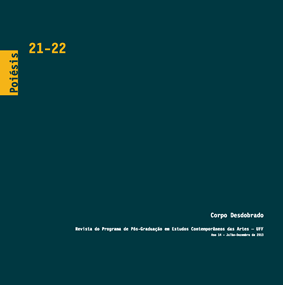O Corpo-Horizonte: sobre Miragens de Regina de Paula
DOI:
https://doi.org/10.22409/poiesis.1421-22.53-64Keywords:
Regina de Paula, corpo, Eu, espaço, olhar, psicanáliseAbstract
Este ensaio problematiza a presença do corpo na arte contemporânea,
defendendo que se trata, no que diz respeito ao corpo, principalmente
de desconfiar de sua própria casa e pôr em questão sua ligação ao Eu. Em um diálogo com a artista Regina de Paula, especialmente sua instalação Miragem, realizada em 2012 na Casa França-Brasil, no Rio de Janeiro, tenta-se demonstrar o poder que o corpo possui de transformar o espaço e pôr em cena o desejo, e argumentar que é muitas vezes necessário que o corpo se faça ausente – mesmo, eventualmente, que ele se dê a ver – para que assim se transforme em um lugar vacante no qual o olhar possa efemeramente se alojar.
Downloads
References
CLARK, Lygia. Lygia Clark e o Espaço Concreto Expressional (1959). Lygia Clark. Rio de Janeiro: Paço Imperial/Minc IPHAN, 1999, p.
-86.
CLARK, Lygia. Do Ato (1965). Lygia Clark. Rio de Janeiro: Paço Imperial/Minc IPHAN, 1999, p. 164-165.
DELEUZE, Gilles e GUATTARI, Félix (1980). Mil Platôs. Capitalismo e Esquizofrenia, vol. V. São Paulo: Editora 34, 1997.
FREUD, Sigmund (1919). Das Unheimliche. Gesammelte Werke. Vol. XII. Londres: Imago, 1955, p. 229-268.
HOFFMANN, Ernst Theodor Amadeus (1917). L’Homme au Sable. Contes Fantastiques. Paris: Flammarion, 1980.
JENTSCH, Ernst. Zur Psychologie des Unheimlichen. Psychiatrisch-Neurologische Wochenschrift, n. 22, agosto de 1906.
Downloads
How to Cite
Issue
Section
License
Authors who publish in Revista Poiésis agree to the following terms:
- The authors keep the copyright and grant the journal the right of first publication. The work is automatically licensed under the Creative Commons Attribution License, which enables its sharing as long as the authorship and initial publication in this journal are acknowledged.
- Authors are allowed and encouraged to distribute online their work published in Revista Poiésis (in institutional repositories or in their own personal page), since this can generate productive interactions, as well as increase the impact and citation of the published work (See The Effect of Free Access).


